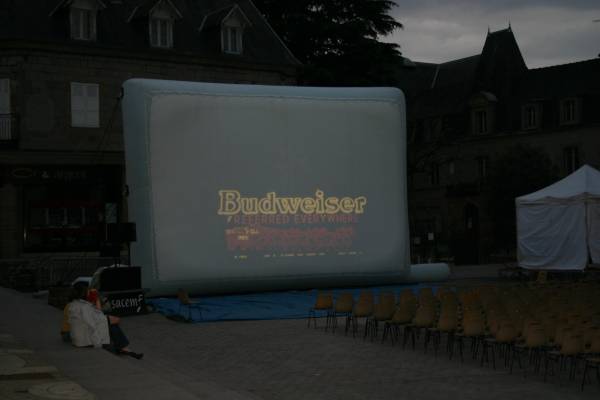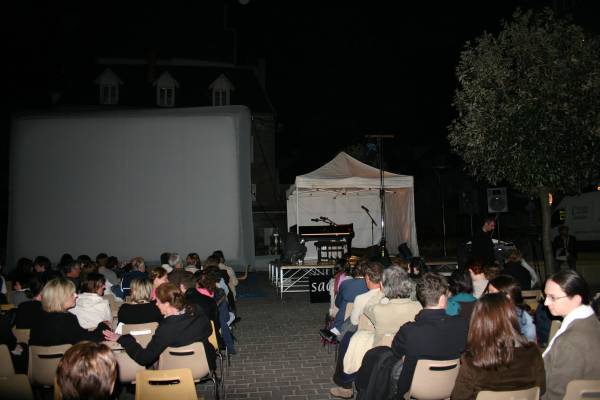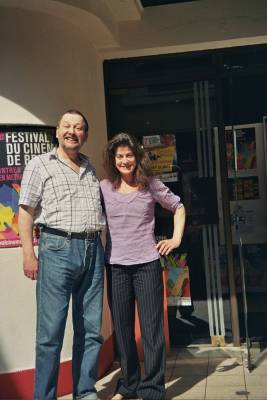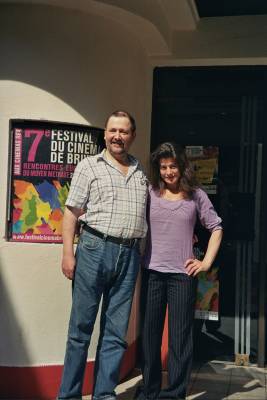7e Festival du Cinema de Brive
21 - 26 April, 2010
Festival Web Site
|
Date+Time |
Title |
| 22 April 15:00 | Lazybones (1935) |
| 22 April 17:00 | The Phantom Light (1935) |
| 22 April 20:00 | The Love Test (1935) |
| 23 April 13:00 | Peeping Tom (1960) |
| 23 April 17:00 | Lazybones (1935) |
| 23 April 20:00 | Red Ensign (1934) |
| 24 April 15:00 | The Phantom Light (1935) |
| 24 April 20:00 | Something Always Happens (1934) |
| 25 April 13:00 | Something Always Happens (1934) |
| 25 April 17:00 | The Love Test (1935) |
| 25 April 20:00 | Peeping Tom (1960) |
| 26 April 15:00 | Lazybones (1935) |
| 26 April 17:00 | Red Ensign (1934) |
|
The Festival du Cinema de Brive specialises in medium length films, usually from 30 - 60 minutes long. They contacted us to see if we could help with an homage to Michael Powell that they were hoping to put on, showing some of the films he made through the 1930s while he was learning his craft. These are often, not always accurately, referred to as "Quota Quickies".
The true quota films were made to satisfy a quota of British films that was required by the Cinematographic Films Act of 1927 (renewed and modified a few times over the following years). The British market was being flooded with American films and the act decreed that a certain percentage or quota of all films shown in Britain must be British made films. There were also restrictions on how much of their profits the American studios could export from Britain, so various American studios set up studios in Britain and made films to satisfy the quota requirements.
These films were usually made quickly and cheaply, a fixed price was paid for them (£1 per foot) but the act made no mention of quality. Some of them were apparently so bad that cinemas showed them while the cleaners were still sweeping out the cinema to get ready for the next day's performances. This let the cinema say that they had screened the film but the public didn't have to watch it.
But some film-makers, most notably, the young Michael Powell, did take advantage of this period to do a lot of good work and to experiment with different styles as they leant their craft. Powell had come back to England in 1929 after doing all sorts of jobs at the Victorine studios near Nice.
Powell's films from this period, before he made The Edge of the World and before he met Pressburger, can't be called masterpieces but they have many points of interest. They are all well made, much better made than was the normal standard for this sort of film. You can also see him experimenting with different styles and techniques which he would use again, to much better effect, in his major films. He is also starting to gather together some of the people who will go on to become The Archers. In these early films he worked with Esmond Knight, Googie Withers, Alfred Junge and others whose names are better known for the films they made with Powell & Pressburger under the banner of The Archers.
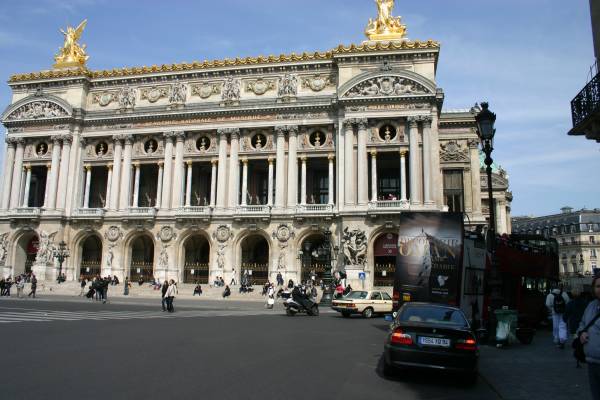 |
 |
The festival itself ran from 21 - 26 April. After careful study of the programme and comparing notes with a few other people I decided that I'd go there on Thursday 22nd and come back on Sunday 25th. To get to Brive I had already decided to take the Eurostar to Paris and then the local (SNCF) train down to Brive. That was a lucky choice because a day or two after I booked the train, the Eyjafjallajokull (pronounced ay-yah-FYAH-lah-yer-kuhl) volcano in Iceland erupted and the cloud of ash that covered much of Europe grounded most planes.
The trip down to Brive was quite quite pleasant. I had over an hour in Paris between the two trains so I went from Gare du Nord to the Gare d'Austerlitz via the Paris Opera so that I could take a couple of pictures of it. Remember the brief scene in The Red Shoes where we see a couple of workmen outside the opera, one of them doing some high kicks. Maybe next time I visit I can get someone to help me re-create that scene.
The SNCF train from Paris, Gare d'Austerlitz to Brive takes about 4 hours but that gave me a good chance to read a lot more of Natacha's book on P&P. We arrived safe and sound and I took a cab to the Hotel le Collonges (in the Place Winston-Churchill, how could I resist?). It's a charming little place, but the couple running it didn't speak much English so we had to struggle through with my poor French. I understand quite a lot of French and I can read it, but I don't speak much, but we got by.

Hotel le Collonges |

Hotel de Ville |

Fountain near the cinema |
I dropped off my bags, had a quick wash and headed out to explore the town. Brive-la-Gaillarde is in the Limousin region and although the train had come through Limoges there aren't really any well known places nearby. Brive itself is a small but elegant town, reasonably well appointed with cafés, bars and restaurants as you'd expect from any French town. They only have the one cinema, the Rex, but it has 3 screens with the largest one holding about 500 people. For the festival they also put on other events around the town.
It was about 9pm by the time I'd arrived and found a few people. That meant that I was just too late to see Powell's The Love Test but I could see an open air screening of 3 short films with a live accompaniment.
The films shown were Entr'acte (1924) by René Clair, Broadway by Light (1958) by William Klein and Un Moment de Silence (1963) by Johan van der Keuken with a live accompaniment by Laurent Levesque.
It's always interesting to see a film in unusual circumstances and this outdoor screening reminded me of the screening of A Matter of Life and Death in the courtyard of Somerset House in London. That one was attended by about 2,000 people. There weren't anywhere near that many for this screening but most of the chairs in the Place du Civoire were taken and was very well received by that audience.
And that was the end of my first day at 2010 Brive Film Festival.
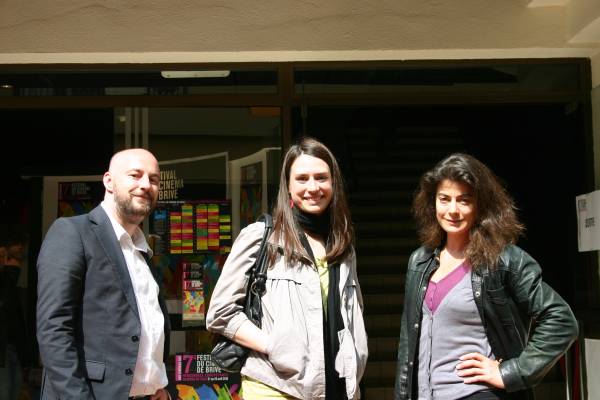
Sébastien, Vanja & Natacha |
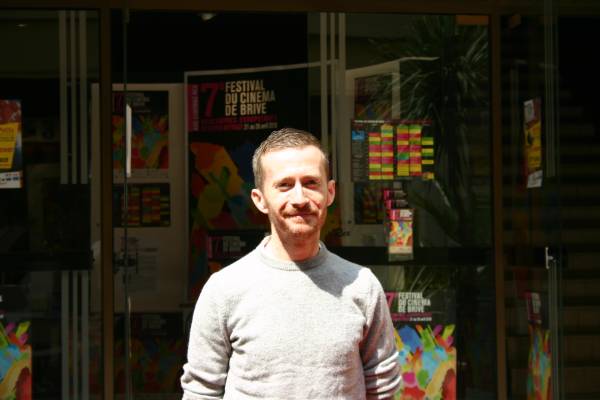
Grégory |
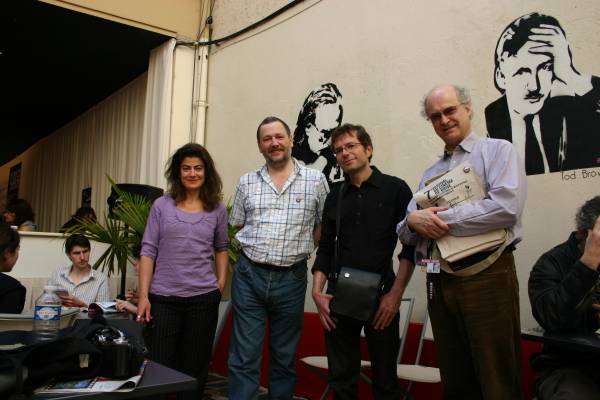
Natacha, Steve, Serge & Peter |
The lovely Natacha had been presenting the new print of The Red Shoes in Paris on the Thursday so she came down to Brive on the Friday. I was actually in a screening of Peeping Tom when she arrived but when that finished we met up at a nearby restaurant. Big hugs and kisses and she introduced two friends from Paris, Serge & Peter.
A wander around town to see the parts I'd already found and to explore some new parts. We had all got our accreditation by then (thanks Marion), one of the advantages of helping festival organisers. We met up with Sébastien Bailly, the artistic director of the festival, and Vanja Kaludjercic, the programming assistant. I had met Grégory Alexandre the previous evening. He was the one who had first contacted me about getting hold of the films that they wanted to show. They were a great bunch of people and we had a lot of fun.
We also met up with PaPAS group member Samuel Bréan and his friend Virginie and they joined us for a few adventures. We also met up with Richard Madjarev who was the president of the jury and a very nice chap. In fact everyone we met was very nice. Nice people at nice events do tend to attract other nice people.
Natacha introduced each of the Powell films (en français) and after each one a lot of people came up to us with questions or comments about these early films or about P&P in general.
After each day's screenings the festival had organised a meal at a local restaurant, a different one each night, for a select group of us. At the first meal we met Arnaud Fleurent-Didier and got chatting, as you do. He told us that he was on the jury, judging the films in competition. He is a musician and was due to give a concert at the festival. Then he asked us what we were doing at the festival. As soon as he heard about our interest in Powell he told us that one of his songs quoted from The Red Shoes. We met him again a few times wandering around town, it's a small town, and we had a few more chats. So I was very pleasantly surprised when, during the very well attended concert he gave in the main theatre, he dedicated one of the numbers his "new friend Steve" and told the audience that the song quoted from The Red Shoes which he considered to be "Powell's masterpiece". It was just a few bars from the ballet music that he quotes, briefly near the beginning and again at the end. It's the little keyboard run that they're having problems with in the film. Vicky can't get the timing right and Julian tells her "See this baton? ... Well follow it!"
I recognised the quote from TRS in Arnaud's song, and told him so when I congratulated him after the concert. Although people who don't know the ballet music very well might not notice it, it really is just a few bars (repeated). It's on the track "Imbécile heureux" which is available on his album "Reproduction" - and it earnt him a place on the Famous Fans list.
We met lots of other interesting people at this lovely little festival. It certainly wasn't the biggest film festival in the world - we'd done that one last year. But Brive has a lot of charm, in the town and in the festival itself. Most of the people there are there because of their love of film rather than for purely commercial reasons as most of them appear to be at Cannes. Whenever enyone showed any interest in or knowledge of the films of Michael Powell (& Emeric Pressburger) they got their badge and a card promoting this web site.
There were some other very interesting films at the festival. I particularly liked The Invisible Frame by Cynthia Beatt where our friend (especially since Cannes in May 2009) Tilda Swinton cycled around Berlin, retracing the route taken by the Berlin wall. Tilda has long been known as an admirer of P&P and in one brief scene she sings the theme song from I Know Where I'm Going! as she cycles around the Berlin countryside.
One I didn't see but the others did see and said was quite remarkable was Mon Père s'appelle Zoltàn by Agnès Szabó. We had met the mother of Agnès at the restaurant the previous evening. In the film Agnès tells how her father died when she was just 5 and she never knew him. The film attempts to draw a portrait of the father she never knew. His story is told by the people who knew him, friends and family and by visiting the places where he lived. It is, I am told, a most moving piece of work.
But all good things must come to an end and it finally came time for me to head homewards. Long lingering farewells, big hugs and lots of kisses and I made my way back to the station. A long train journey (4 hours) back to Paris and then a mad dash across Paris to get the Eurostar - which I missed by 5 minutes. It was my fault, I didn't leave enough time to get across Paris, even on a Sunday. But they put me on the next "flight" through the tunnel. The chap in the next seat had chosen the vegetarian option for the meal they serve. I must do that next time, the chicken was quite disgusting and remained untouched after the first nibble. But that gave us a reason to start chatting and when I got around to talking about Powell & Pressburger (it never takes long) he said that he was Australian and was interested in the work done by Robert Helpmann. See, there's nearly always someone involved in the P&P films that people can connect to.
Back in England, it's not raining (for once) but it is quite heavily overcast. I got the tube at St. Pancras but that only took me as far as Kennington. I tried the replacement bus service but that was very difficult with a big suitcase in a crowded bus so I got off that at Stockwell and took a cab for the rest of the way home.
And that's the end of the story of my "Brive Encounter" :)
I'll add any more photos and other reports from other people as they are sent to me.
Other P&P trips








